The birth of the Soviet missile defense system. Long ascent to Elbrus
It is very difficult to write about the era of the 1970s-1980s, mainly because at that time the intensity of passions and the concentration of all kinds of meanness in the process of developing computers reached a maximum and ended in a piercing crescendo with the collapse of the USSR.
It is extremely difficult to understand this mess, but the facts remain facts - when the iron curtain of external and internal secrecy fell, we suddenly discovered that the level of Soviet computerization in comparison with the West is simply shocking.
We all heard Babayan's incredible legends about "the best computers in the world that have no analogues", but in reality we saw the gigantic corpses of useless "Electronics SS BIS", "Row 4", Intel 386 level and occupying 50 square meters. m, Babayanovsky "Elbrus-3", which in general for 10 years was not mastered to bring at least to the stage of inclusion, and its ancestor - "Elbrus-2", into which (according to the director of ITMiVT Ryabov) about 2 billion modern prices (three nuclear submarines could be built).
Actually, the Elbrus project became a kind of high point of the fall of the Soviet computer program (in this formulation).
On the one hand, they could no longer build anything more complicated and sophisticated in the USSR, on the other, the project became synonymous with sawing, intrigue, all kinds of dirt, a bunch of strange circuit solutions, copying Western routes and everything for which Soviet machines were criticized.
The turning point for the entire Soviet computer program (as well as the missile defense program) was the years 1970-1975.
During these five years, the domestic supercomputer industry finally turned into a dead end and then continued to briskly rush forward, until in 1991 it hit the wall.
Traditionally, the answer to the question of what happened is simple and classic - so the vile traitors began to copy IBM, and that's all broken.
This answer is easy and nice, but completely wrong.
The ES computer project had nothing to do with Soviet supercomputers at all and did not interfere with them in any way, on the contrary, it helped, as it allowed access to a bunch of good peripherals.
The true reasons for what happened in those years are much deeper: the catastrophe of the 1970s became the natural end of a long path along which Soviet science, industry and politics did not stop moving.
It seems that Kennedy said that the greatness of the state is determined by the amount of Olympic gold, nuclear missiles and the brand of the presidential limousine.
The independence of the state in IT technologies and their level can be determined very easily by looking at its supercomputers (by the way, from this point of view, there are no superpowers in the world other than the United States now: the entire TOP500 runs exclusively on American technologies, even the vaunted Chinese Loongson / Godson is just a clone of MIPS, ShenWei is a variety of implementations of SPARC and a stolen DEC Alpha, and FeiTeng is an ARM instruction set).
As for the USSR, the greatness of the domestic supercomputer program stood on three pillars - nuclear weapons, air defense and missile defense.
(photo http://www.mcst.ru, https://en.wikipedia.org, https://en.wikichip.org/, https://www.itweek.ru, https: //www.baikalelectronics .ru)
Only for these three directions the most highly productive Soviet systems were developed, ranging from BESM and Strela and ending with Elbrus for the A-135 missile defense system and 5E26 on-board computer for the S-300 air defense system.
That is why when we saystory Soviet informatics ", we, first of all, say" the history of Soviet supercomputers ", and, talking about their history, we, in turn, inevitably bump into the history of air defense / missile defense and the Soviet nuclear project.
And that is why this series of articles relates entirely to the development of the Soviet missile shield, although, without having a complete picture in my head, it is difficult to notice this.
The stories of Kartsev, Burtsev, Lebedev, Yuditsky, Melnikov, Kalmykov, Shokin, Lukin, SVTs and ITMiVT - they are all closely twisted around the same thing: attempts to create The most powerful Soviet computer, one of the main applications of which was to be missile defense.
That is why we argue that one of the most important turning points in the history of Soviet informatics was not the creation of BESM-6, not the beginning of the development of the ES computer, not the first Soviet clone of Intel.
The main turning point in the history of all Soviet computer science was 1972 and an episode that, for an outside observer, is not related to computers at all.
SALT-1 Treaty and ABM Limitation Treaty.
We intend to offer one of the possible interpretations of the events of that year.
To do this, we need to trace what and how led to it and what consequences it had for Soviet informatics and the development of missile defense systems.
In order not to confuse readers, we cannot do without a clear outline of this complex story, which will be revealed in the last few articles of this series.
In the first two of them, we will consider the political events that led us to the 1970s (from the point of view of events in the world, the party and the Academy of Sciences of the USSR), then the arrangement of the pieces on the board and the motives and directions of their moves will become clear to us.
Then we will go directly to the technical part - a description of the Elbrus circuitry, its prototypes, the history of its development and implementation.
Finally, we will talk about its use in the A-135 system and the end of the Soviet missile defense program.
Politicians and academics
In the continental model of government (mainly Prussian, which was borrowed after the accession of Karl Peter Ulrich Holstein-Gottorp, better known as Peter III, and the Russian Empire), in contrast to the Anglo-Saxon, the idea of the existence of an institution out state and without its every second direct control and management caused horror.
Science did not escape this either, which administratively missed the world more than 200 years ago and remains there to this day.
In the Anglo-Saxon tradition, which has reached its absolute in the USA, the processes of reproduction of scientific knowledge, from schooling to the National Academy, are almost completely separated from the state, just like the church.
Academies are ordinary clubs of scientists (which not only do not receive a salary for their titles, but also pay membership fees). The state has nothing to do with the policy of the Academy (moreover, in principle there is no concept of a state and non-state academy), it can act as only one of the sponsors of one or another scientific club.
Academicians do not receive any bonuses and preferences from the state, and the only thing that gives them this status is respect among colleagues.
The Russian Academy was organized in a similar way before Lomonosov - in Russia there were no academic titles or degrees, and such regalia acquired in Europe did not bring any dividends, except respect.
Lomonosov was inspired by the Prussian model and decided that a society without color differentiation of pants is barbarism.
His project was implemented in 1803, when the master of science was equated to the rank of IX class (titular adviser or captain in the army), and the doctor of science to the rank of VIII class (collegiate assessor or major).
By 1884, the class hierarchy of scientists was finally formed: the rector automatically became a real state adviser, the dean and ordinary professor became a state adviser, and so on up to an adjunct corresponding to a collegiate assessor.
Taking into account that the personal nobility in the civil service automatically complained, starting from the ninth grade, all Russian scientists without exception were formally nobles in 1917, no matter what they later wrote in Soviet questionnaires about parents from workers and peasants.
Naturally, if the state gives some goodies, it is foolish to think that it will not demand anything in return.
As a result, throughout the XNUMXth century, tsars and prosecutors cheerfully twisted the noose of censorship and control on science.
One hundred years of monstrous obscurantism led to the fact that the outstanding mathematician, the first Soviet Fields laureate S.P. Novikov called "the enormous provincialism of the Russian school."
The inertness and oakiness of thinking even of relatively progressive Russian scientists of those years was simply amazing. For example, the forgotten S.N. Korsakov, back in 1832, filed a patent for the so-called. "Machine for comparing ideas" - now it could be described as a full-fledged DBMS (only mechanical!).
The main carrier of information in the machine was (long before Hollerith) punched cards, stored in special file cabinets and automatically sorted and compared according to certain criteria. Almost all the principles that formed the basis of the tabulator known to us, created more than fifty years later, are implemented in his developments.
The idea was phenomenal, but the difference with the US was visible even then. Hollerith became a millionaire and founded IBM, while Academician Ostrogradsky declared to the unfortunate Korsakov:
As a result, Korsakov's machine was used by him personally in his library, and then was safely lost, and his name itself was so firmly forgotten that it surfaced only in 2001, when, desperate to achieve interest in this topic in Russia, professor of the Department of Cybernetics at MEPhI G.N. . Povarov wrote an article for the book Computing in Russia published in Germany.
How many more amazing inventions are buried forever in the royal archives - it's hard to say.
When, in 1876-1881, the genius Russian mechanic and the father of differential geometry, P.L. Chebyshev designed a perfect adding machine with a planetary gear, allowing not only to add and subtract, but also to divide and multiply, he did not become a Russian Burroughs.
Perfectly understanding the level of intellectual life of the Russian Academy of that time, Chebyshev did not even try to promote his invention here - he took him to the Paris Museum of Art, where he earned the highest praise from the best European mechanics and mathematicians.
As a result, the Chebyshev transmission scheme was borrowed by them for the first electromechanical calculators, while in Russia a primitive adding machine from the Swede Odner was used for another hundred years until the 1980s.
We must pay tribute to the early Bolsheviks - they tried to really destroy everything that was worst in the old world in the most radical way, not excluding the approach to the management of education.
Under Lenin, in the theses of Pokrovsky (Deputy People's Commissar of Education) in 1918, the main communist principle of building a just classless scientific society was formulated: the first Soviet reorganization of science consisted in the destruction of the class privileges of scientists.
From now on, no documents on secondary education were required to receive higher education. A person simply expressed a desire to study at a university, and he was enrolled there. After graduating from the university, he was not given any diploma. If a graduate had a penchant for science, then he simply came to a scientific institution and studied science there, not caring in the least about defending dissertations for scientific degrees, because scientific degrees and academic titles were also abolished.
From the entire multi-storey hierarchy of scientific workers of the empire, only the academic title of professor remained, and if a university graduate without a diploma showed outstanding results in scientific activity, then he could be elected a professor for a period of five years at a meeting of a scientific institute or university, in the latter case - with mandatory participation in college student elections.
In fact, it was an extremely progressive system, but, like all good things, it did not last long.
Pants color differentiation returned a year later, in 1919.
All scientific workers were divided into five categories by the decree of the Council of People's Commissars. The categories determined the value of the scientist for the authorities at the moment and, accordingly, the size of his ration and monetary allowance.
Color differentiation of pants
Stalin, having come to power, began to profess the classical doctrine - everything is for the state, nothing outside the state, while understanding the party by the state, and personally by the party.
Naturally, the Academy, being an independent assembly of the country's highest intellectuals, could not fail to be reformed in the right way.
From the middle of 1925, the Politburo began discussing the reform of the Academy of Sciences, and by 1926 the control system returned to the tsarist model, only instead of religious-monarchical censorship, Stalinist censorship began.
The Academy of Sciences became completely state-owned, academicians (and corporal members, by the way, such a double division is also typical only for the Prussian model, as well as the division of degrees into candidates and doctors) became civil servants and were completely integrated into the vertical of power.
Like the personal nobility under the tsar, under Stalin, scientists also received their place in the party table of ranks, and with it a full set of material benefits: summer cottages, drivers, special hospitals and special shops, a huge lifetime pension.
In exchange, all science became party science.
In 1928, five digital categories of scientists were reduced to three alphabetic ones (scientists of the category “A”, “B” or “C”), and in 1934 the Council of People's Commissars restored the old imperial scientific hierarchy, only cosmetically editing it.
At the beginning of 1928, Stalin summoned the secretary of the Academy, S.F. Oldenburg and for the first time directly demands to be elected academicians not for knowledge, but along the party line:
The academics were shocked: for all the tsarist censorship, the government had never intervened in the elections to the Academy of Sciences.
The elite of science has split - what to do with this demand?
On January 17, Pavlov sharply protests against the arbitrariness of the Bolsheviks. He is admonished by the famous mathematician and mechanic Krylov, who showed much greater moral flexibility:
As a result, from the first call, party officials were given a ride.
Stalin is furious, a massive propaganda campaign against "anti-popular science" begins.
- Write an appeal to the representatives of the Leningrad Communist University.
By February, the academicians were scared enough to do everything right on the second run, but it was too late. In the same year, the "Commission for cleaning the apparatus of the Academy of Sciences" was established in the Central Committee of the Party. By the end of 1929, 1 employees were arrested in the AN Case, they were accused of plotting against the Soviet government and creating the "All-People's Union of Struggle for the Revival of Free Russia."
The head of the Commission, Figatner, reported to Moscow:
The most dangerous direction for the authorities, the historical one, was the very first to be defeated.
After 1917, the Academy gained access to the huge archives of the tsarist regime, including police files and Okhrana papers. All this was confiscated by the GPU, the information found and those who managed to get acquainted with it were reported personally to Stalin and Molotov. Apparently, the leaders did not really want any unpleasant surprises of their pre-revolutionary activities to surface.
From that moment on, Russia systematically began to turn into a country with an unpredictable past, and Soviet historiography - into a collection of the lives of saints (a similar situation was repeated in 1991 - first, almost unlimited access to the archives of the NKVD / KGB, a few years later the authorities came to their senses and classified everything again, and now the unpredictable past is even what it was 20 years ago).
The resolution of the Central Committee of the All-Union Communist Party of Bolsheviks of November 14, 1938 on the production of party propaganda in connection with the release of the “Short Course in the History of the All-Union Communist Party of Bolsheviks” read.
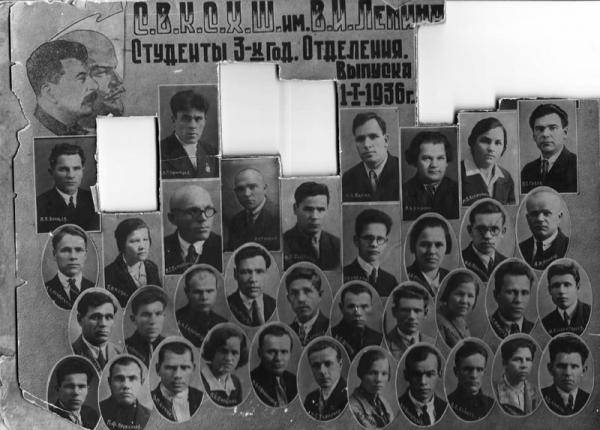
In 1933, Kalinin signed an order under which the USSR Academy of Sciences lost the last vestiges of independence.
It was subordinated directly to the government, and on April 25, 1934, Molotov transferred the Academy of Sciences from the old capital, St. Petersburg, to the new one, Moscow.
The ideological purge of the enemies of the people was led by the legendary "red professor", already mentioned in this series of articles by Ernest Kolman.
Back in 1930, Stalin demanded
And the incredibly flexible and obsequious Kolman was chosen as the main sewer.
He bears the main responsibility for most of the atrocities in science of the 1930s - the arrest and death in prison of the famous mathematician Yegorov, the execution of the mathematician and economist Nikolai Kondratiev and the destruction of the entire statistical school in the USSR, the pogrom of the scientific school of Luzin, the persecution of V.I. Vernadsky, S.I. Vavilova, L.D. Landau, I.E. Tamma, Ya.I. Frenkel and many more.
The crazy Kolman considered himself a great mathematician and physicist and consistently attacked all scientific areas, not bypassing either hydrodynamics or the theory of relativity with his close attention, and, like an inquisitor, he everywhere found a terrible heresy against the teachings of the party.
Naturally, the dire psychological consequences of such reforms were not long in coming.
The remnants of the Academy's independence were brutally broken and crushed, the surviving scientists were forced to develop an incredible skill of doublethink, the ability to fluctuate along with the party line, hypocrisy, fantastic moral flexibility and mastery of undercover struggle and intrigue.
In addition, normal science was generously diluted several times by a stream of newly-minted doctors, academicians and rectors, appointed not for knowledge, but along the party line.
Since then, this practice has become one of the main features of Soviet, and then Russian science - all the bread positions, starting from the administration of top universities, gradually began to be occupied not by the most talented, but by the most pleasing authorities.
In addition, during the Stalin years, science was also castrated creatively.
Gennady Aleksandrovich Sardanashvili, an outstanding theoretical physicist, an expert in the field of geometric methods of field theory and the theory of gravity, writes:
Having deprived the national science of freedom, it was deprived of creativity. Soviet science "turned gray".
As a result, for example, having at their disposal for almost 10 years the largest accelerators for their time, Soviet physicists were unable to obtain any outstanding results. None of the modern unified models of elementary particles (it would seem that this is necessary) is not registered by Russian scientists.
The wild intoxication of pogroms was forced to end only in 1941, and already in 1945 it became clear that without fundamental science there would be no military technologies.
Stalin was shocked by the power of the military-scientific machine of the West - radars, radio fuses, missiles and an atomic bomb; he realized perfectly well that without these wonderful toys the USSR was doomed.
If it were not for the development of nuclear weapons and air defense systems in 1946-1950, then, who knows, perhaps Operation Dropshot could take place.
The boot was immediately removed from the neck of the Academy. Those who did not have time to be shot were amnestied, the maniac Kolman was exiled away to Czechoslovakia in 1945, and in 1948 he was generally arrested and imprisoned without trial or investigation in the Lubyanka, where he spent time alone until 1952.
Beria was given control of the nuclear project and almost complete freedom to do whatever it took to carry it out, freeing the most talented Soviet physicists from all forms of censorship.
It was at this moment that the final demarcation of Soviet physicists took place into those who are engaged in the latest fields of modern science, and classical physicists (for example, mechanics) who remained with mathematicians. It got to the point that they did not even really communicate, classical Soviet mathematicians did not want to know advanced physics, and advanced physicists did not go to classical mathematicians.
That is why in the USSR later only a few mathematicians (close to physicists, Arnold, Novikov, Shafarevich and a few less well-known ones, Gusein-Zade and Bogoyavlensky, for example) understood dynamical systems, algebraic topology and other modern areas, and the Mekhmat of Moscow State University for 1950– The 1980s gradually turned into a remote outskirts of world mathematics, where they read and studied mainly the courses of the XNUMXth century.
On the part of physicists, the bridge to mathematicians was built by Landau with his legendary Theorminimal and his main competitor Bogolyubov. Theoretical physicists became a separate caste, remaining decent people in many respects, and one of their leaders, Sakharov, generally later headed the dissident movement.
Mechanics-mathematicians (based mainly in Steklovka and Moscow State University) were left to slowly rot in their isolated jar of scorpions.
The incredibly solemn and pompous celebration of the 220th anniversary of the Academy of Sciences in the summer of the victorious 1945 became a symbol of the leader's final reconciliation with scientists.
The hall of the Bolshoi Theater and the Kremlin Palace were given for the holiday, more than a hundred foreign scientists were invited (for the first time since the 1920s!), scientists were showered with gifts, titles, monetary allowances and state awards. Portraits of physicists and mathematicians (and not Marxist philosophers) first appeared in newspapers as a symbol of Soviet science.
The celebrations went very well, everyone exhaled a little, however, the monstrous trauma of the thirties was never eradicated by Soviet science.
From this point of view, the celebration of the 220th anniversary of the Academy only consolidated the victim syndrome - it showed that power can cruelly take away and generously bestow in equal measure.
Sardanashvili writes:
Other participants of the Atomic Project were awarded in the same way.
The living conditions of the academicians: medical and sanatorium care, food supply (“feeding trough”) and other benefits were almost at the level of deputy ministers.
However, the leader’s sense of fabulous grandeur has not disappeared anywhere.
My father told me that Leontovich was instructed to read a greeting to Comrade Stalin on the occasion of his 70th birthday, I think, at a meeting of the Department of Physical and Mathematical Sciences of the USSR Academy of Sciences in 1949.
And Leontovich disgraced himself: while reading this greeting, while listing the toasts addressed to the leader of the world proletariat, he missed the title that had just arisen, “the coryphaeus of science.” To the excited party secretary, who rushed to him in horror after the meeting, he said: “I didn’t prepare, I missed this new word out of surprise.”
The case was not given a move, but the security authorities constantly considered Leontovich capable of committing an "enemy wrecking act." As they say, Beria ordered to endure him only because of the qualifications necessary for the implementation of a thermonuclear project.
- recalled Academician Novikov, Keldysh's nephew.
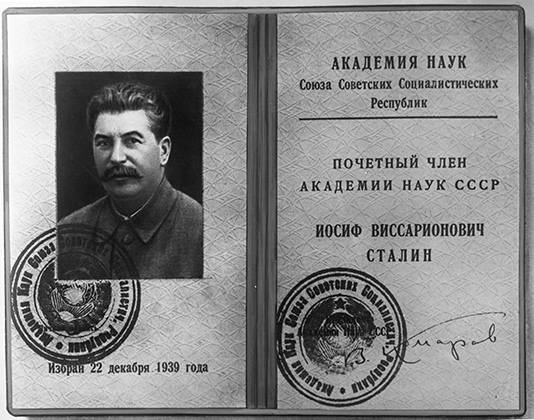
So Soviet science merged with the civil service, politics and ideology into a mutant, the analogue of which the world has not yet known, and remained in this form forever.
The already mentioned Novikov partially described all this in his memoirs:
<...>
There is no legal procedure for changing specialty. You must always be a member of the Academy with the specialty in which you were selected to the last level ...
It was necessary to implement the very procedure for transferring to the physics and mathematics department, where Keldysh had never been selected, through academicians, prominent scientists. We need an authoritative academician who will push this through, while not being embarrassed by falsification.
Vinogradov undertook this. He escaped from the post of director of Steklovka when the institute moved to evacuation to Kazan at the end of 1941. It was he who fled, fearing responsibility during the war period, especially terrible at the beginning: who knows, they can be shot if some task is not completed. The frivolous Sobolev became the director.
When everything stabilized, Vinogradov wanted to return, but how?
Then he joined the NKVD.
And it was Vinogradov who was pushing Keldysh. These were the roles in this theatre. Vinogradov did dirty things for Keldysh, and he said, sighing: “I can’t do anything, Ivan Matveyevich is my teacher.” And hung another star on his chest.
<...>
The overthrow of Günther (and Yegorov in Moscow) was part of the campaign to liquidate the old intelligentsia in 1928-1933.
In Leningrad, this campaign was carried out by Vinogradov together with the protege of the Regional Party Committee Leifert. In 1937, Leifert was arrested and died, like most of those who worked in the Leningrad Regional Committee under Kirov. On this campaign, Vinogradov became an academician ahead of schedule (instead of a member correspondent) in 1929, destroying the first candidate, member member Gunther, through denunciations.
<...>
Who are these "Vinogradov's people" who worked with the documents?
He had a scientific secretary since the 30s, an absolutely illiterate scientifically cunning type nicknamed Walrus. It was K.K. Marzhanishvili, the son of a famous Georgian artist, whose name, in my opinion, he dishonored. They wrote a dissertation (of course, a poor one) and quietly made him a doctor. Then he was appointed to the post of head of the closed department of Steklovka (from the NKVD - MVD - KGB system). Then they attributed some imaginary merits and promoted to a member of the correspondent in 1964.
These were the first elections in mathematics under President Keldysh, who separated mathematicians from physicists.
In particular, in these elections, Keldysh betrayed Gelfand, who did a lot of work for him, apparently, was no longer needed. Ladyzhenskaya and Arnold were dismissed in the elections to member corps and Walrus was promoted.
They made him an academician in 1974.
He worked, in particular, with ballots in any elections, if they needed it.
That's what we thought in the Department.
There were interesting stories with the minutes at the General Meeting.
Gelfand was elected an academician only 20 years later, in 1984, at the same time they elected Arnold a corresponding member and took control of the VAK.
<...>
Aleksandrov, the cunning fox, as they called him.
Later, he cleverly bought Keldysh as well, making him "three kaka", as they said at the time.
This meant that he created, as they say now, a brand: KKK - Kurchatov, Keldysh, Korolev - Nuclear-Missile Shield of the Motherland.
Keldysh did not support Aleksandrov as President of the Academy before Brezhnev, as I thought earlier. He recommended Logunov.
The main scarecrow of the Stalin era, as we have already said, was (and not without reason) the nuclear bombing of the USSR.
All scientific efforts after 1945 have been devoted to solving two problems: to acquire their own nuclear weapons as soon as possible and to develop protection against enemy bombers as soon as possible.
The first resulted in a nuclear project under the leadership of Beria (which, by the way, he brilliantly completed), and the second - in emergency work in the field of radar, computer systems and anti-aircraft missiles.
It was for these tasks that ITMiVT was founded, for these tasks three so-called. Main directorates under the Council of People's Commissars of the USSR. The 1st GU was in charge of scientific and technical support for the creation of the bomb, the 2nd GU was responsible for the management of all uranium mining enterprises, and the 3rd GU was responsible for radar and air defense.
This was the beginning of the history of BESM and Strela, computers for missile defense and air defense - this is already step number two, taken under Khrushchev.
He, in a certain sense of the word, was a romantic and admired science of science.
It was under Khrushchev that the USSR carried out the most complex technological projects: the first hydrogen bomb, a nuclear power plant, an ICBM, Sputnik-1, Gagarin's flight, Voskhod, the atomic icebreaker Lenin, the first Soviet nuclear submarine - K-3 Leninsky Komsomol, the beginning the moon race, transistors and the first microcircuits, the foundation of Zelenograd.
Under Khrushchev, whole new sectors of the economy arose, such as the production of plastics and mineral fertilizers, a powerful complex of industrial housing construction was created, the fruits of which Russia still enjoys.
The automotive industry has reached a point where the car, while still a scarce product, has nevertheless become a means of transportation rather than a unique luxury.
Developed civil aviation. Steam locomotives were discontinued on the railways. The extraction of energy carriers made it possible to start mass exports of oil and refined products abroad.
Under him, the development of the first Soviet supercomputers was started and anti-missile defense was created.
In general, the Union did not know such a rise in science either before or after it, in fact, the entire development of technology in the USSR under Brezhnev is the exploitation of the groundwork made by Khrushchev.
However, for all that, Khrushchev had a fundamental flaw - he did not even have a normal basic education. Until the age of nine, he studied at a parish school, then his father took him from there to work in the field.
As a result, Khrushchev, for all his sincere love for science, did not understand a damn thing about it at all, and he often considered scientists to be fantastic charlatans like Lysenko, whom he literally prayed for.
It is not surprising that biology and agriculture under him not only did not advance, but were completely ruined (remember, for example, the “Ryazan miracle”). Khrushchev, like a real peasant, adored the most primitive crowbar solutions (and any problems at that), the essence of which could be explained to him in two words. In order to explain the more complex concepts, the leader had to play the most complicated pantomimes, as with the founding of Zelenograd.
It is clear that there was no way to explain to Khrushchev how a lamp is worse than a transistor (and what a transistor and a microcircuit are in general), so they worked on contrast. First, they led him past the puffing Strela, then they brought in the Staros HX-1 mini-computer, then they showed him a tube radiogram and put a miniature transistor radio receiver in his ear.
The presentation, as we know, was a brilliant success, and Zelenograd was founded.
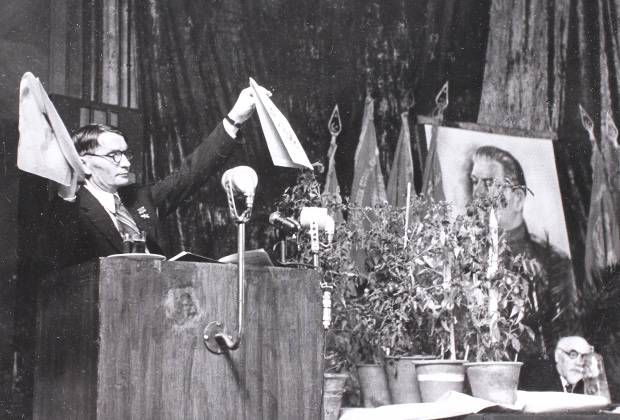
At the end of the reign, Nikita managed to ruin relations with everyone. With academicians who did not forgive him for Lysenko and general illiteracy.
It got to the point that in 1964 he promised to disperse the NA to hell (and it’s not a fact that he would have made a mistake in this decision, considering what a viper it had already turned into), but he didn’t have time.
He quarreled with the intelligentsia no less, at first everyone was delighted with the thaw, but then they were severely broken off by Khrushchev's tastes in art (also purely peasant).
With the workers, who at first also welcomed the reforms that ended with the Novocherkassk massacre.
With the Stalinists, who hated him for denigrating the image of the great Stalin, with the anti-Stalinists, dissatisfied with his rudeness and loud rudeness.
And most importantly, during the 10 years of Khrushchev's rule, his own officials tasted the whole sweetness of life without fear, and their ambitions increased. Now they no longer dreamed that they would not be shot, but that there would be no master over them at all.
However, he managed to carry out the reform of the Academy of Sciences.
In 1961, the Academy lost almost all technological research institutes (more than 50) and branches (all 7), as well as 20 thousand personnel. All of them were withdrawn from its composition and distributed among the relevant ministries.
In the course of the reform, Khrushchev had a severe quarrel with the president of the Academy of Sciences Novikov and removed him from his post, appointing in his place the cunning politician, intriguer and careerist Keldysh.
In fact, the reform has been brewing for a long time and its preparation was initiated by a letter to the Central Committee of Kapitsa himself, who can hardly be suspected of wanting to destroy Soviet science.
AN was indeed a clumsy monster and something had to be done about it.
But the result was extremely sad.
In 1964, after the resignation of Khrushchev, new ministries arose - such as the electronics industry and the radio industry, and most of the specialized research institutes, laboratories and testing grounds went to them.
Why is it so bad?
It's all about the personality of the next secretary general - Brezhnev.
Watch for a direct continuation of this story in the next article.
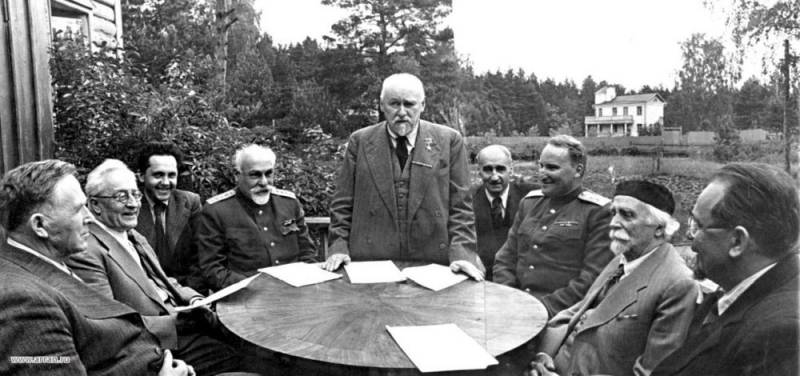

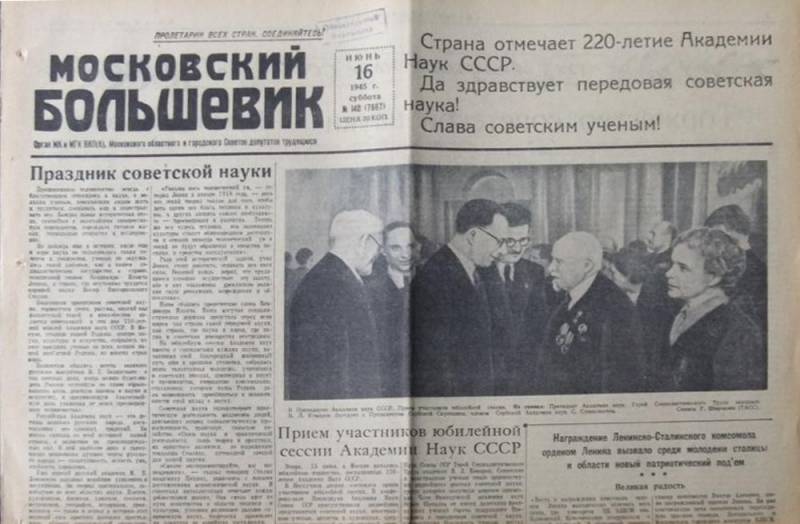
Information